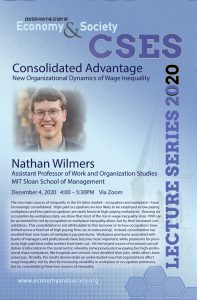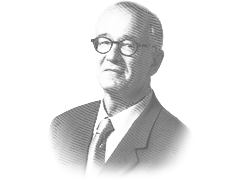Paul DiMaggio, NYU – 3/19/21
Andy Summers, London School of Economics – 3/5/21
Lucas Drouhot, Max Planck Institute – 2/18/21
Walter Powell, Stanford – 2/11/21
Delia Baldassarri, NYU
Between in-group selection and economic interdependence: Field experiments on prosocial behavior in a multiethnic society
- 12:00 - 1:30 PM
- via Zoom
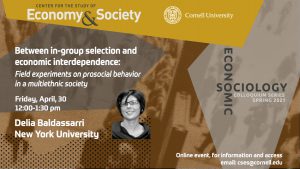
How does prosocial behavior extend beyond in-group boundaries in multiethnic societies? Recent waves of immigration in Western societies have led scholars to conclude that ethnic heterogeneity undermines trust, social capital, and collective goods provision. However, the type of prosociality that helps heterogeneous societies function is different from the in-group solidarity that glues homogeneous communities together. The interdependence and division of labor of life in contemporary urban settings often forces people outside the comfort zones of their familiar networks to constructively interact with unknown, diverse others. Using a large-scale lab-in-the-field experiment with representative sample of Italian natives and immigrants from the metropolitan city of Milan, we study behavior toward coethnics and non-coethnics in strategic and non-strategic interactions. We find that when given the opportunity to select their interaction partners, Italians favor coethnics over immigrants. However, when forced to interact with non-coethnics, as it happens in many economic transactions, Italians generally treat them similarly to how they treat coethnics. They also value signs of social and market integration. Taken together, these results contribute to make sense of the persistence of discriminatory behavior toward minorities in selection processes, as well as confirm contact theory intuition that interaction with outgroup members, especially when individuals have common goals and equal status in the interaction, is likely to foster prosociality.
Paul DiMaggio, NYU
When Content is King: Using Topic Models to Analyze Online Innovation Crowdsourcing at IBM
- 12:00 - 1:30 PM
- via Zoom
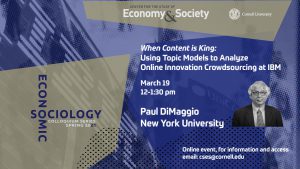
Over the past twenty years, a major development in firms’ innovation strategies has been the emergence of crowdsourcing as a tool to stimulate new ideas. A growing literature has examined the process by which ideas are winnowed from such discussions for further develop¬ment. This talk focuses upon a surprisingly neglected factor: the substantive content of em¬ploy¬ee interventions. We demonstrate the utility of topic modeling as an approach to extracting thematic information about discussion content and serving as a basis for identifying significant collective concerns and the degree of consensus around them, the alignment of posts with both elite and consensus emphases, and evidence for deliberative learning during discussion threads. We use this approach to analyze an influential example of such discussions and demonstrate that posts selected to exemplify promising ideas for innovation emphasized particular themes, were aligned with cues from organizational elites as well as reflecting broader topical emphases, and were both generative of and influenced by relatively long ex¬changes. Finally, we consider feat¬ures of the discussion design and selection process that may have accounted for the results we report.
Andy Summers, London School of Economics
A sociological analysis of the UK’s global elite: evidence from tax records
- 12:00 - 1:30 PM
- via Zoom
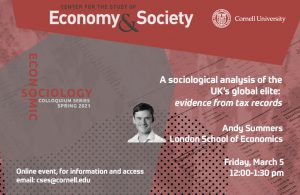
The UK has proved an attractive destination for the world’s top earners and high net wealth individuals. In 2017, around one quarter of the top 1% by income originally came from abroad, rising to one third amongst the top 0.1% and to nearly four in ten of those within the top 0.01%. Although many of these migrants settle permanently, the UK offers a special tax regime to those who maintain foreign connections, who are known as ‘non-doms’ (i.e. individuals not domiciled in the UK). In the popular imagination, non-doms epitomise a globalised economic elite, simultaneously exerting significant influence within British society, yet remaining weakly tied to the place where they live. We use administrative tax data covering every individual who claimed ‘non-dom’ status from 1997-2017 to provide the first sociological anatomy of this enigmatic group. We will present our initial findings on their national origins and the neighbourhoods within which they live, allowing us to explore the non-dom population on scales from the global down to local. We will also outline an agenda for further work on the sociology of elites in the UK.
Lucas Drouhot, Max Planck Institute
Cracks in the Melting Pot? Religiosity and Assimilation among the Diverse Muslim Population in France
- 12:00 - 1:00 PM
- via Zoom
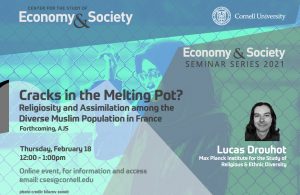
The maintenance of high religiosity levels among Muslim youths in Western Europe constitutes a puzzle in need of an explanation. Focusing on France and using a new empirical strategy for the quantitative study of cultural differences between heterogeneous populations, this study first demonstrates that French Muslims form a diverse group yet one with a consistent and sizable “religiosity differential” resisting intergenerational assimilation to native levels. It then formulates and tests five hypotheses to explain the second generation’s delayed religious assimilation. Material insecurity, the perception and self-report of discrimination, parental religious socialization, transnational ties with the origin country, and neighborhood ethnic segregation are all influential but with an uneven impact across subgroups within native and Muslim populations. Together, results suggest that the religiosity differential stems from a mixture of cultural transmission from the context of origin and blocked acculturation due to stratification and social closure in the context of destination.
Walter Powell, Stanford
Seeing Like a Philanthropist: From the Business of Benevolence to the Benevolence of Business
- 12:00 - 1:30 PM
- via Zoom
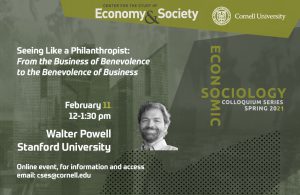
Over the course of American history, philanthropists have been both praised and pilloried, depicted as redeemers of democracy and a threat to it. Despite the shifting social terrain in which they have operated, philanthropists — and the organizations they create — have grown in number and influence, acting as a catalytic force in the genesis and development of the modern nonprofit sector. Philanthropic largesse has also played a powerful role in shaping civic life and political affairs. We argue that it is important to understand not only how philanthropists are seen, but also how they see. In narrating the development of American philanthropy from the late 19th to the early 21st centuries, our aim is to capture changes in what it means to “see like a philanthropist”—that is, to illuminate the meanings and ends of philanthropic wealth. We focus on three core influences on philanthropic visions: (1) the sources of philanthropic wealth, (2) its organizational embodiments, and (3) the criticisms leveled at its outsized influence. We examine the reciprocal dynamic between political challenges to elite power and philanthropic visions. We show that philanthropists have transposed the practices they used to earn their great fortunes into the organizational routines of their philanthropies and turned these into requirements for those who receive their funding. The actions of past philanthropists weigh heavily on future philanthropists, Consequently, the political might of philanthropy both channels and enables the critiques to which its influence is subjected. In narrating this long arc of history, we show how the super-rich’s perceptions of themselves and their role in public life have evolved as well as the myriad ways philanthropy has altered civic and political discourse.
Economic Sociology Colloquium Series
Spring 2021
- 12:00 - 1:30 PM
- via Zoom
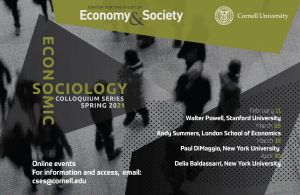
Nathan Wilmers, MIT
Consolidated Advantage: New Organizational Dynamics of Wage Inequality
- 4:00 - 5:30 PM
- via Zoom
